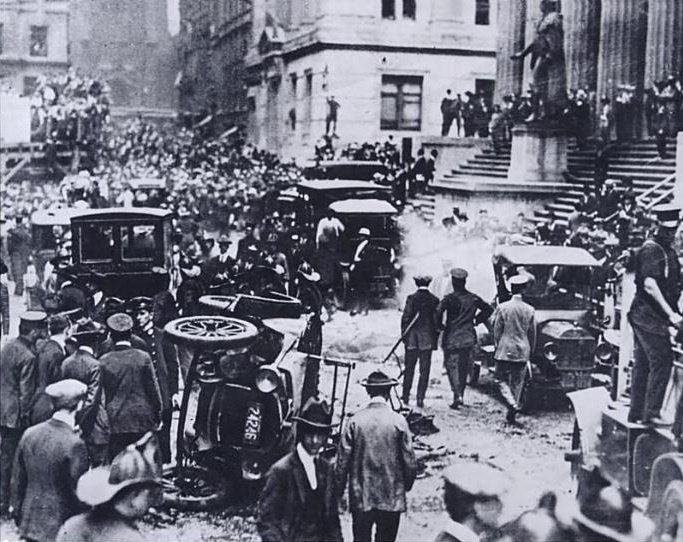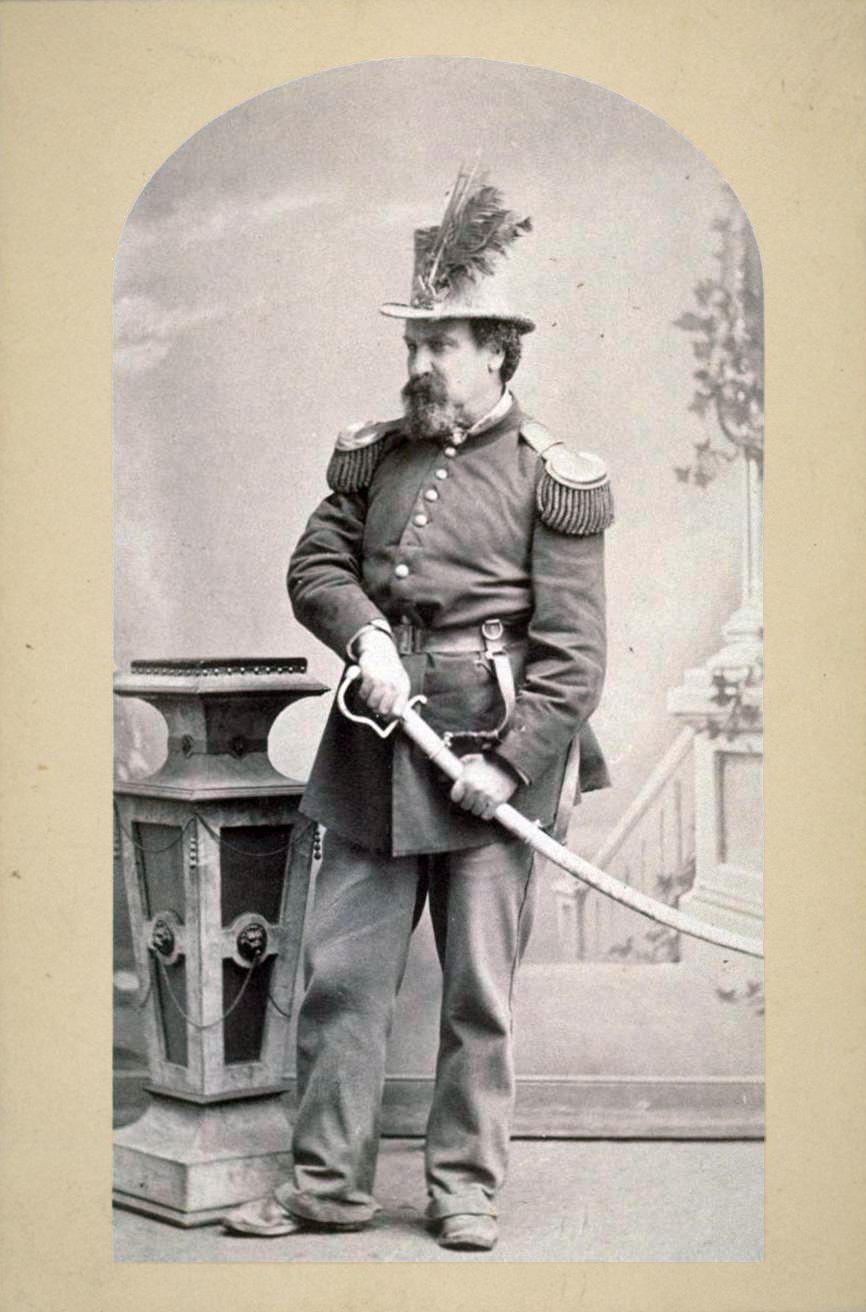Horse-Drawn Terrorism

September 16, 1920 -
At 12:01 pm a bomb hidden in a horse-drawn wagon exploded
on the corner of Wall Street and Broad Street in New
York City's Financial District. The blast killed 38
people and wounded another 400. The bomb, fitted with a timer set to detonate at the height of the lunch
hour, was comprised of 100 pounds of
dynamite and 500 pounds of cast iron sash weights, intended to act as shrapnel. Police initially thought the explosion was an accident and contacted
local companies that dealt in explosives to see if any shipments had been
scheduled to pass through that part of the city. By the time the police
realized it was an intentional attack the area had been cleaned up and useful
evidence had been destroyed. While investigators suspected that anarchists were responsible for the attack, no group ever claimed
responsibility and no one was ever charged with the crime. Remnants of the damage from the attack are still visible today on the exterior walls of the
J.P. Morgan Bank building.
|
America's Emperor
September 17, 1859 -
Joshua Norton, an
eccentric and mentally-unhinged businessman in San
Francisco, declared himself to be Norton I, Emperor of the United States.
Norton, who was born in London and raised in South Africa, moved to San Francisco in  1849. After losing his
fortune investing in Peruvian Rice, Norton declared bankruptcy and left San Francisco for a short
time. In 1859 he returned and sent a proclamation to various newspapers in the
city declaring himself to be Emperor of the United States. During his "reign"
as emperor, Norton issued numerous decrees that were published in local papers including
an order that the U.S. Congress be dissolved by force, and that the
Republican and Democratic parties be disbanded. He further declared it a misdemeanor to refer to San Francisco as "Frisco" and would issue a
$25 citation to anyone he heard using the term. Norton was much loved and
revered by the citizens of San
Francisco. Although penniless, he regularly ate at the
finest restaurants in the city
and would often attend the openings of plays in specially reserved balcony
seating. Norton spent his days as emperor inspecting the streets of San Francisco in an
elaborate blue uniform with gold-plated epaulets, which had been given to him
by officers of the U.S. Army. He would examine the condition of
sidewalks and cable cars and the appearance of police officers, who regularly
saluted him as he passed. Norton even issued currency in his name, which was
honored by the local establishments he frequented. When he died in 1880 the San
Francisco Chronicle printed his obituary on the front page under the headline
"Le Roi est Mort" (The King is Dead). As many as
30,000 San Franciscans turned out to pay homage to the United States' only emperor. Norton was the inspiration for the character King in Mark Twain's book Huckleberry Finn. 1849. After losing his
fortune investing in Peruvian Rice, Norton declared bankruptcy and left San Francisco for a short
time. In 1859 he returned and sent a proclamation to various newspapers in the
city declaring himself to be Emperor of the United States. During his "reign"
as emperor, Norton issued numerous decrees that were published in local papers including
an order that the U.S. Congress be dissolved by force, and that the
Republican and Democratic parties be disbanded. He further declared it a misdemeanor to refer to San Francisco as "Frisco" and would issue a
$25 citation to anyone he heard using the term. Norton was much loved and
revered by the citizens of San
Francisco. Although penniless, he regularly ate at the
finest restaurants in the city
and would often attend the openings of plays in specially reserved balcony
seating. Norton spent his days as emperor inspecting the streets of San Francisco in an
elaborate blue uniform with gold-plated epaulets, which had been given to him
by officers of the U.S. Army. He would examine the condition of
sidewalks and cable cars and the appearance of police officers, who regularly
saluted him as he passed. Norton even issued currency in his name, which was
honored by the local establishments he frequented. When he died in 1880 the San
Francisco Chronicle printed his obituary on the front page under the headline
"Le Roi est Mort" (The King is Dead). As many as
30,000 San Franciscans turned out to pay homage to the United States' only emperor. Norton was the inspiration for the character King in Mark Twain's book Huckleberry Finn.
|
A Girl's Best Friend
September 18,
1837 - Tiffany & Co., which was first named Tiffany & Young, was
founded by Charles Tiffany and Teddy Young in New York City. The store was called a
"stationery and fancy goods emporium." In the following decades the firm's emphasis on jewelry was established, and in 1853 the name was shortened to
Tiffany & Co.
The company now operates more than 167 stores worldwide and is considered one
of the world's finest jewelers. The company's branding is strongly associated with
its Tiffany Blue, which is a registered trademark.
|
|
"Whoever after due and proper warning shall be heard to utter the
abominable word 'Frisco', which has no linguistic or other warrant,
shall be deemed guilty of a High Misdemeanor, and shall pay into the
Imperial Treasury as penalty the sum of twenty-five dollars."
- Emperor Norton I
|
Moby Dick
by Herman Melville
|
|